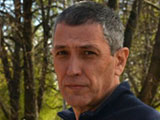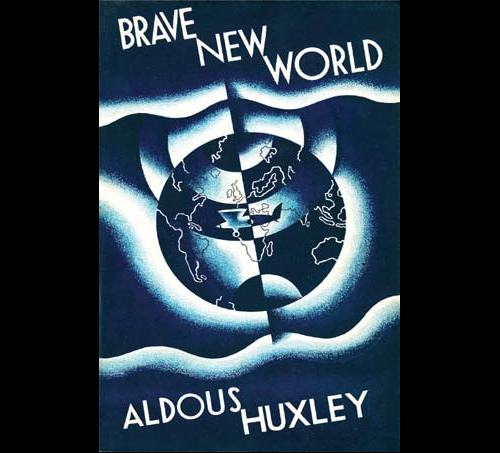Brave New World: A Liberal Dystopia? Pt. I
by Israel Centeno and translated by Kelly Harrison / January 15, 2013 / 1 Comment
Where science and technology become the tools of enslavement.
Below is part one of a series continuing the themes discussed in a previous series of articles concerning George Orwell’s Nineteen Eighty-Four and Animal Farm. This section focuses on Aldous Huxley’s Brave New World and addresses the issue of a future without freedom, from subtle dictatorships to totalitarianism.
During the interwar period, in 1931, Aldous Huxley wrote Brave New World, a novel that relates the adventures of Bernard Marx, an “Alpha” man living in a seemingly perfect world where happiness is the norm. Yet Marx is a non-conformist and that marginalizes him to a certain extent; his only empathic relationship is with Lenina, a “Beta” woman. Both of them question a society which has no room for questions, where everything is ostensibly resolute, or at least driven by the consumption and enjoyment of happiness. Consequently, in their search for answers, they decide to leave London, their home town, and head for the Savage Reservation called Malpais, a place where the uncivilized live.

- From his lonely watch post Albert Camus asked who among us has not experienced exile yet still managed to preserve a spark of fire in their soul. “We’re all alone,” Natalia Sedova cried in exile on hearing of her husband Leon Trotsky’s affair with Frida Kahlo. In his novel Night Watch, Stephen Koch follows the incestuous love affair of David and Harriet, wealthy siblings watching the world from their solitary exile. Koch’s writing, Camus’s theories, and Trotsky’s affair all come back to exile and lead me to reflect on the human condition. From my own vantage point, my Night Watch, I will reflect on my questions of exile, writing, and the human condition.

- Israel Centeno was born in 1958 in Caracas, Venezuela, and currently lives in Pittsburgh as a Writer-in-Residence with City of Asylum/Pittsburgh. He writes both novels and short stories, and also works as an editor and professor of literature. He has published nine books in Venezuela and three in Spain.
In Brave New World, society is divided into castes: Alpha, Beta, Gamma, Delta, and Epsilon. Words such as “mother” and “father” are considered obscene, as children are created via a process of in vitro fertilization and grow up subjected to Pavlovian conditioning and hypnopaedia. The aim of this educational process is to give the individuals a sense of happiness: They must feel happy—satisfied—with belonging to their caste and carrying out their jobs and roles. In order to heighten and strengthen happiness, as well as to satisfy any needs, the citizens take soma, a perfect drug that provides pleasure.
In Brave New World, freedom is lost and happiness is won, or imposed. There are neither values, nor emotions—at least, nobody stops to look. The only thing that seems to be important is having an easy life without problems and without boredom. What matters is having fun. There are no problems because all difficulties are countered with soma.
Despite the reduction of human beings into the mindless gears of a social machine, everything appears to function in a convenient and ideal way in Brave New World. In George Orwell’s Nineteen Eighty-Four, manipulation and propaganda drain people of their independence and freedom, subjecting them to an ideological dictatorship. But in Brave New World, a lifestyle is imposed by means of psychological and genetic manipulation. In a system more akin to a liberal dystopia, where happiness is achieved through consumption and social networks are places of “maximum fulfillment,” technology and science—rather than propaganda—are the tools that program individuals against independent thinking. Behaviorism and genetic biology strip citizens of the intrinsic value of choice. In this perfect society man does not have God (instead he has Ford), nor does he have free will: He does not decide, he does not choose.






One Comment on "Brave New World: A Liberal Dystopia? Pt. I"
Very good post! We are linking to this particularly great
content on our site. Keep up the good writing.
Heree is my website … Internal communications (Freya)